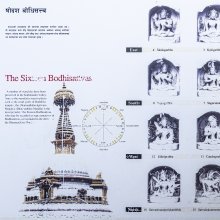Samrakshita, Saṃrakṣita: 7 definitions
Introduction:
Samrakshita means something in Buddhism, Pali, Hinduism, Sanskrit, Marathi. If you want to know the exact meaning, history, etymology or English translation of this term then check out the descriptions on this page. Add your comment or reference to a book if you want to contribute to this summary article.
The Sanskrit term Saṃrakṣita can be transliterated into English as Samraksita or Samrakshita, using the IAST transliteration scheme (?).
Images (photo gallery)
In Buddhism
Mahayana (major branch of Buddhism)
Source: De Gruyter: A Buddhist Ritual Manual on AgricultureSaṃrakṣita (संरक्षित) refers to the “protection (of crops)”, according to the Vajratuṇḍasamayakalparāja, an ancient Buddhist ritual manual on agriculture from the 5th-century (or earlier), containing various instructions for the Sangha to provide agriculture-related services to laypeople including rain-making, weather control and crop protection.—Accordingly, [After the Brahmin Viṣṇudatta summoned and enraged a Nāga]: “Then Vajrapāṇi, the great leader of Yakṣas, addressed the Bhagavān, ‘Look, Bhagavān, clearly all crops have been destroyed by the harmful Nāga. How will there be shelter for all beings in the last time, in the last age, after you have departed? Therefore let the Bhagavān speak about the protection of crops and the averting of Nāgas for the sake of all crops. [Thus] all crops will be provided, protected (saṃrakṣita) and increased’”.

Mahayana (महायान, mahāyāna) is a major branch of Buddhism focusing on the path of a Bodhisattva (spiritual aspirants/ enlightened beings). Extant literature is vast and primarely composed in the Sanskrit language. There are many sūtras of which some of the earliest are the various Prajñāpāramitā sūtras.
Languages of India and abroad
Marathi-English dictionary
Source: DDSA: The Molesworth Marathi and English Dictionarysaṃrakṣita (संरक्षित).—p (S) Preserved, kept, taken care of.
Marathi is an Indo-European language having over 70 million native speakers people in (predominantly) Maharashtra India. Marathi, like many other Indo-Aryan languages, evolved from early forms of Prakrit, which itself is a subset of Sanskrit, one of the most ancient languages of the world.
Sanskrit dictionary
Source: Cologne Digital Sanskrit Dictionaries: Shabda-Sagara Sanskrit-English DictionarySaṃrakṣita (संरक्षित).—mfn.
(-taḥ-tā-taṃ) Taken care of, preserved, protected. E. sam before rakṣ to preserve, kta aff.
Source: Cologne Digital Sanskrit Dictionaries: Monier-Williams Sanskrit-English DictionarySaṃrakṣita (संरक्षित):—[=saṃ-rakṣita] [from saṃ-rakṣa > saṃ-rakṣ] mfn. protected, preserved, taken care of [Manu-smṛti; Mahābhārata etc.]
Source: Cologne Digital Sanskrit Dictionaries: Yates Sanskrit-English DictionarySaṃrakṣita (संरक्षित):—[saṃ-rakṣita] (taḥ-tā-taṃ) a. Preserved.
Source: DDSA: Paia-sadda-mahannavo; a comprehensive Prakrit Hindi dictionary (S)Saṃrakṣita (संरक्षित) in the Sanskrit language is related to the Prakrit word: Sārakkhia.
[Sanskrit to German]
Sanskrit, also spelled संस्कृतम् (saṃskṛtam), is an ancient language of India commonly seen as the grandmother of the Indo-European language family (even English!). Closely allied with Prakrit and Pali, Sanskrit is more exhaustive in both grammar and terms and has the most extensive collection of literature in the world, greatly surpassing its sister-languages Greek and Latin.
See also (Relevant definitions)
Partial matches: Rakshita, Sam.
Starts with: Samrakshita-kshetra, Samrakshitavya.
Relevant text
No search results for Samrakshita, Saṃrakṣita, Samraksita, Sam-rakshita, Saṃ-rakṣita, Sam-raksita; (plurals include: Samrakshitas, Saṃrakṣitas, Samraksitas, rakshitas, rakṣitas, raksitas) in any book or story.
